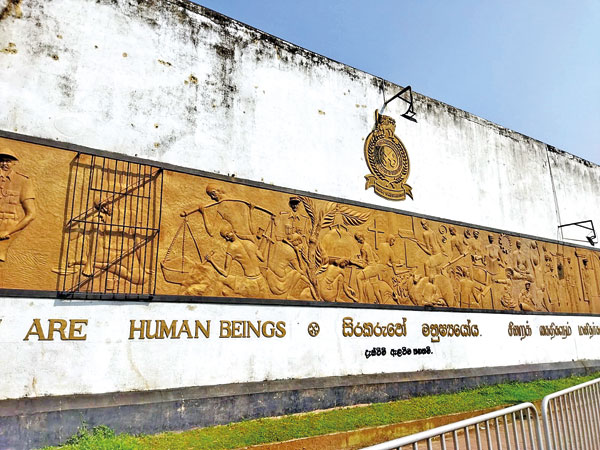News
Lawyers, rights activists alarmed by revised jail rules
View(s):By Renishka Fernando
The Welikada Prison proudly proclaims in a slogan on a wall that, ‘Prisoners are human beings’, but a recent gazette notice has alarmed lawyers and prisoner rights activists that basic rights are being breached.
An extraordinary gazette was issued on July 12, 2022 by Justice, Prison Affairs and Constitutional Reforms Minister Wijeyadasa Rajapakshe.

Ambika Satkunanathan
It notifies of rules made by the minister under section 94 of the Prisons Ordinance (Chapter 54). While it was not taken up in Parliament on October 7, the minister told the Sunday Times that it would be debated on November 2.
Senaka Perera, lawyer and chairman of the Committee for Protecting Rights of Prisoners (CPRP), said: “Mental health is extremely important for prisoners. If that is not protected, then a corrected and rehabilitated person does not come out.’’
Mr Perera noted that while some rules would benefit prisoners, for the most part, the gazette had restricted their rights.
For instance, Rule 80 allows a sentenced prisoner to be considered for placement under correctional supervision, or parole, on the recommendation of the medical board appointed by the Minister of Health, if a medical officer or practitioner has diagnosed them with a serious illness from which they are unlikely to recover.
In addition, the Ministry of Justice through the Ministry of Health could forward a report to the President detailing the medical conditions of a prisoner. Such a report should confirm that further imprisonment could endanger his life or he or she has been diagnosed with a terminal illness which may cause his or her death before the end of sentence; that the sick prisoner has family members willing to take care of him in the event of release, or that their mental condition will be adversely affected by further imprisonment.
Through this, the granting of a pardon could be considered under Constitutional provisions.
“It’s hard to say how effective Rule 165 is as they are unable to provide necessary facilities to children,” Mr Perera said.
Rule 165 provides for food, education, medical facilities for children below 5 years whose mothers are in prison.
The present rules allow six days of visits to prisons with the exception of Sunday. However, the gazette calls for a reduction in visits, minimising it to one a week, lasting not more than 15 minutes, and allows only a party of three from the immediate family or nominated persons.
“Our main concern is a scientific and logical method to rehabilitate prisoners. This is a clear infringement of their rights,” Mr Perera said.

The CPRP is examining the gazette to discern if there are any inconsistencies with the Prisons Ordinance.
Mr Perera told the Sunday Times, the group would challenge the gazette if inconsistencies were found.
Human rights activist Ambika Satkunanathan, a former commissioner of the Human Rights Commission of Sri Lanka (HRCSL), said: “The Mandela rules state that the deprivation of liberty is the punishment. But here it’s not just a deprivation of liberty, the conditions (in which) they are imprisoned, also constitute degrading and inhuman treatment.’’
She released a briefing note on October 23, highlighting the issues in the gazette.
Ms Satkunanathan said the medical board mentioned in Rule 80 has been used in an ad hoc manner, which is also highlighted by the former Commissioner General of Prisons (CGP), H.G. Dharmadasa.
As quoted in her note, Mr. Dharmadasa says the medical boards are ad hoc as there is no permanent medical board, because its composition changes depending on the nature of the illness. For instance, one board would require a neurologist, while another requires an oncologist. He further highlights that courts are the custodians of imprisoned persons and that prisons have to report back to courts when an imprisoned person has to be released while expressing uncertainty regarding its present practice.
The note also narrates the experience of a person with a disability at the Welikada prison. The prisoner had complained to the HRCSL that although his name was referred by the prison authorities to the head office for 12 years, he has still not been produced before the medical board.
The gazette also calls for a risk assessment of security in each prison.
As soon as a person who has been sentenced for more than six months is admitted, a risk assessment will be done by a prisoner assessment committee and then at least once every 12 months to determine whether the person should be transferred within the prison or to another prison. Factors such as age, sex, social, psychological background, etc are to be taken into account in deciding on transfers.
Ms Satkunanathan notes that the purpose of this assessment appears to be not to review the progress in the rehabilitation of the imprisoned person and to revise it to enable the imprisoned person to rebuild their life or to prevent harm, but rather to ensure the security of the prison.
She adds that mental health professionals should assess whether a person is likely to self-harm, or has mental health issues as prison officers are not equipped to do so.
The gazette which retains Rule 196, allows a civil prisoner or an unconvicted prisoner to be placed in a cell or a room that is better equipped than an ordinary cell. The rule which has been amended only allows this for civil prisoners.
Ms Satkunanathan said that in practice, prisons do not segregate prisoners as criminal and civil prisoners, and secondly, that allowing a person to pay for additional services is discriminatory as it gives importance to a person’s social status and economic resources.
Finally, as civil prisoners are those imprisoned due to the inability to pay fines or maintenance due to insufficient financial means and “should not be imprisoned in the first place’’.
Commenting on the limitation of visits she states that, “It is unclear how visits of family members of incarcerated persons can impact adversely or otherwise, the ‘reputation of others or the authority and impartiality of the judiciary.’ In identifying the root causes for restrictions, she notes that the size of the prison population and shortage of officers are directly connected, as certain entitlements require more officials to check food, supervise visits, and outside hours.
“These reforms were introduced in the best interests of the prisoners so we could provide them with the best facilities,” said Minister Rajapakshe.
Due to concerns raised by activists and lawyers regarding prison visits, he told the Sunday Times that it would be amended, allowing six days of visits.
At present, the ministry is searching for new buildings to ensure that children are provided the required facilities under Rule 165.
Meanwhile, he noted that mental health support for prisoners was inadequate and a new system to provide facilities was being discussed.
When asked whether there was a shortage of prison officials, Mr Rajapakshe said a new batch had been recruited.
“During the drafting of these regulations, I was not involved. Therefore, certain matters need to be resolved during the committee stage in Parliament,” he said. If there are injustices, amendments will be made, he said.
The best way to say that you found the home of your dreams is by finding it on Hitad.lk. We have listings for apartments for sale or rent in Sri Lanka, no matter what locale you're looking for! Whether you live in Colombo, Galle, Kandy, Matara, Jaffna and more - we've got them all!

